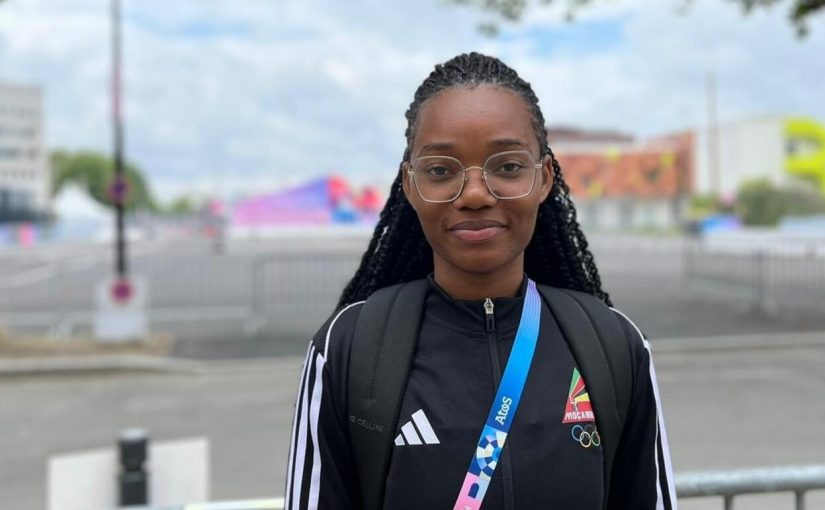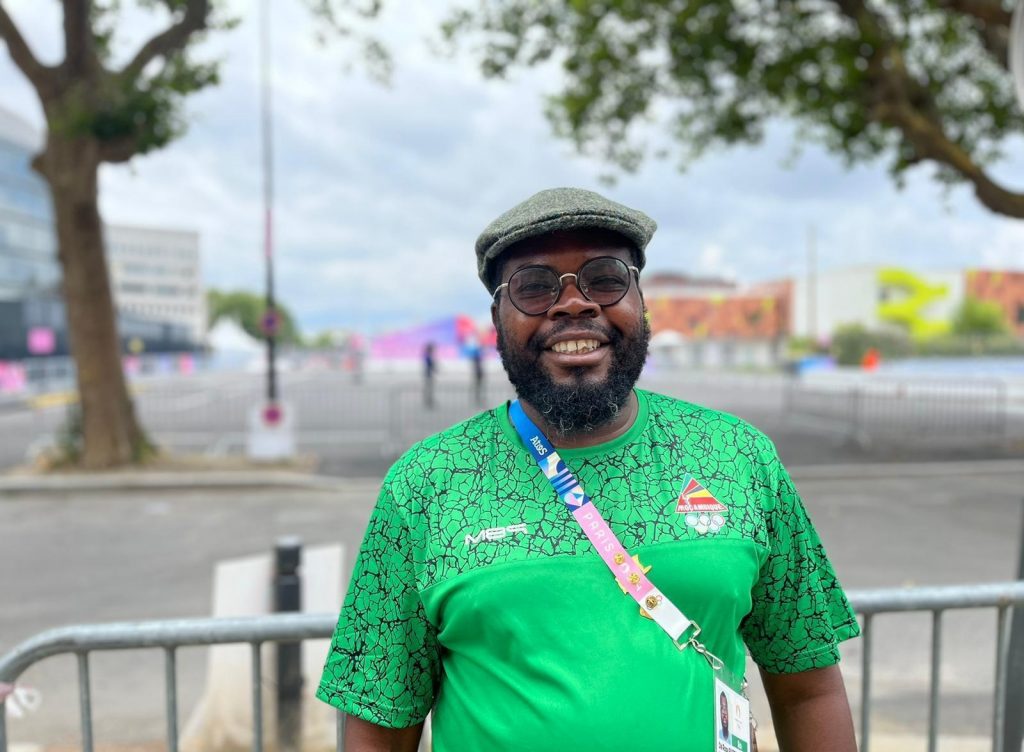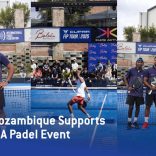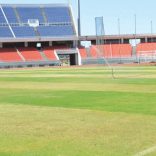Paratus Mozambique powers back onto the grid for September Super Picanto Cup
“The Olympic Games are for everyone and I am living proof of that” – Deizy Nhaquile

Deisy Nhaquile,Mozambican sailor, at the 2024 Paris Olympics
With just days left until the official opening of the Paris Olympic Games, athletes continue to arrive at the Olympic village, in the Paris region. “I make these Olympics as if they were my first, where I can experience everything, from the village to the opening, from the wonderful experience of being at the biggest event in the world. I want to enjoy and represent my country in the best possible way,” says Mozambican sailor Deizy Nhaquile.
Mozambique will participate in boxing, swimming, sailing, athletics and judo at the Paris Olympic Games, which officially start on Friday, 26 July. The Mozambican delegation is made up of seven athletes, one of them Deizy Nhaquile, a 23-year-old Mozambican sailor, who is participating in the Sailing event in Marseille. The Olympian is in the Laser Radial class, now called ILCA 6, and told us about her fight to join the Paris Olympics.
RFI: How does it feel to be representing Mozambique at these Olympic Games?
Deizy Nhaquile (DN): It is very gratifying to be here representing Mozambique at the Olympic Games. These are my second Olympics and I want to give everything in these. Unfortunately, in the first few in Tokyo 2020 I had Covid and my performance wasn’t very good. I treat these Olympics as if they were my first, where I can experience everything, from the village to the opening, and the wonderful experience of being at the biggest event in the world, I want to enjoy myself and represent my country in the best way possible.
RFI:Is it an unprecedented moment to be here in Paris, at the 2024 Olympic Games?
DN: It’s unprecedented. Firstly because it is not easy to qualify for the Olympic Games. All other countries try hard. So, happiness also comes from conditions that weren’t that good to qualify me. Unfortunately sailing is a very expensive sport. I can’t do all the championships and even without resources, my South African coach calls me to train because he says I’m a talented athlete. He tells me that unfortunately I live in a country with a shortage of various resources and calls me to support myself and try to qualify. I reached the Olympic Games after a lot of effort. There are athletes who manage to participate in several championships and I only managed to get an internship after winning a World Cup. I know an athlete from Tunisia who trains here in France and I don’t have the same conditions, but I tried hard and managed to qualify.
RFI. You didn’t participate in many competitions due to lack of resources and managed to qualify to be here. What counts most: your willpower, talent or luck?
DN: First God. I’m a Christian, so I believe it’s God. These are God’s plans for my life and also my work, not only mine, but also that of everyone else who tries to help Deizy, which is my club. The Clube Marítimo de Desportos has the Mozambican Canoe Sailing Federation and also has an Olympic committee. I have the Olympic solidarity grant, which is an added value for countries that do not have several conditions. The Olympic Games are for everyone and I am living proof of that.
RFI: Was it a lot of work for you to be here today?
DN: In addition to being a privilege, there is a lot of struggle to be here. This is the biggest event in the world. When you’re in the cafeteria, you start to get that idea. When you’re in the Olympic village you start to imagine how unprecedented all this is. It’s a party. I spent the last four years fighting to be here.
RFI: Mozambican athletes arrived in France at the beginning of July to train for two weeks in the city of Saint-Paul-les-Dax?
DN: We all went on an internship to focus on one place and to start getting into the spirit of the Olympic Games. Unfortunately I had to train on a lake, but it was more valuable to get into training, because during the internship in Mozambique we weren’t 100% focused on training and here we are far from home. My home for training is very far away and has several things. Sometimes not being able to eat properly was a plus, because there we were completely focused.
RFI: Unfortunately it was a lake. Does it make a difference?
DN: It does make a difference, because in Marseille we have waves. The wind conditions are completely different and we have a very strong wind, we have very big waves and the conditions are completely different.
RFI: Do you feel like you are ready for competitions?
DN: It’s difficult to answer, but I feel ready to enjoy this event. I prepared for four years and there comes that moment when it seems like you’re not ready. It seems like you need more than a year of preparation, but we’re already here, so let’s enjoy it.
RFI: How is the energy in the Mozambican delegation?
DN: The energy is good, we are very happy to be here. Unfortunately I can’t stay in Paris with the other athletes because my races are in Marseille and there are only three of us; me, my coach and the president of the Federation.
RFI: Is the goal the medal?
DN: I am very focused on my goals. Not that I don’t like to dream big, but I think that any athlete has to put their feet on the ground and know what work is done to reach a medal. We still need a lot of investment. My country needs to invest a lot and a medal doesn’t come through luck, it comes through hard work. All countries put in a lot of money, a lot of investment and sometimes it is a long-term investment. We can’t just want to work four years or a year in advance to get a medal.
We can very well think about starting to invest to have a medal in 2032. If we don’t start investing now in 2032, we won’t have anything. But if we start investing now, we can have a medal in 2032. So far, Mozambique only has one Olympic medal achieved by athlete Lurdes Mutola. I think it’s time to start investing. Not just worry about qualifying, but start thinking about an Olympic medal.
RFI: What will your program be in the next few days, until the first tests?
ND: Arriving in Marseille we will see the sea, learn about the conditions. The regattas begin on August 1st, my competition begins and ends on the 5th. The following day, August 6th, the medal race for the top ten takes place.
Coach Hélio da Rosa speaks
Deizy Nhaquile is being accompanied by her coach and the president of the Mozambican Sailing and Canoeing Federation, Hélio da Rosa, who described to us the athlete’s work to be present at this, the biggest sporting event in the world.

RFI: Is being in Paris representing Mozambique a source of pride?
Hélio da Rosa (HR): It really is an honour to represent Mozambique at the Olympic Games. We have a very wide range of Olympic sports in Mozambique, but not all of them are here and those that are here I can consider to be the best of the best. Being in Paris at the qualified Olympic Games is an honour, it means that the Federation has been doing a very good job and it will continue. We have already been to two past editions of the Olympic Games: we were with canoeing in Rio, we were with sailing and canoeing in Tokyo and now we are with sailing in Paris. This means that during this period that we were working, my colleagues and I managed to do what few federations did.
It’s really a lot of work because it’s not easy to qualify for the Olympic Games. In Deizy’s case, it’s been three years of hard work and a lot of injuries. At times she wanted to give up, but we always have to be there and we have to be fathers, mothers, psychologists, a lot of things. At the end of it all, we feel proud because it was a job that was worth it.
RFI: Can you explain to us the process of preparing athletes to be here?
HR: Normally, the athlete’s qualification is the responsibility of the Federation. The Olympic Committee supports us and the Mozambican government has also supported us, but it is all up to the Federation and we, as a federation, have to be the ones to create conditions so that the athlete can represent the country in all competitions, both qualitative and non-qualitative. When I say non-qualifying, they are the ones in which we really have to participate, the running calls so that the athlete can compete to have a running session so that when they go to the qualifying competitions they are prepared to be able to achieve their true objective.
RFI: How many competitions are we talking about?
HR: Deizy has participated in four World Cups and two in Africa.
RFI: Is she, in fact, African runner-up?
HR: Yes, the African runner-up, she lost the title to the Tokyo runner-up because her direct opponent is Egyptian and was racing in her own country. When you are in your waters, you are the one in charge. That’s why I say she is a warrior because she was in Egyptian waters and managed to reach second place. She has been showing that sailing in Africa is to be invested in because it is a modality that people normally connote as a modality for people with means because renting a sailing boat and all the material is not cheap at all.
RFI: Is sailing a recent sport in Mozambique?
HR: It’s not very recent because if I remember correctly, in 75 or 78 we organised the World Championship, so it’s an old sport. Only later did we have a small drop in the number of participants with the organisation of the African Games. In 2011, sailing re-entered the world of major competitions, because at the African Games we had sailing and canoeing as two disciplines in the games. They were also the two modalities that managed to bring medals to the country, along with judo.
RFI: I imagine that when you follow each of Deizy’s tests, you feel nervous?
HR: Clearly, because I was also an athlete. Those butterflies appear, but we cannot transmit them to the athletes because we have to let them know that we are aware and confident in them. But the butterflies in your stomach are something that always appear, especially when you’ve been on that side. Regardless of whether you are the best or not, the chill always appears, because you never know what your opponent has in store for you.












Leave a Reply
Be the First to Comment!
You must be logged in to post a comment.
You must be logged in to post a comment.